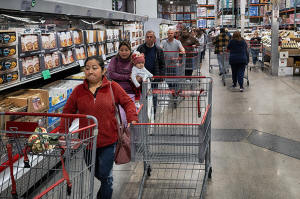Tariff threats and uncertainty could weigh on consumers, drag down US
economy, gov't report suggests
[March 01, 2025] By
CHRISTOPHER RUGABER and ANNE D'INNOCENZIO
WASHINGTON (AP) — Ongoing tariff threats from Washington and potentially
sweeping government job cuts have darkened consumers’ mood and may be
weighing on an otherwise mostly healthy economy.
Data released Friday showed that consumers slashed their spending by the
most since February 2021, even as their incomes rose. On a positive
note, inflation cooled, but President Donald Trump’s threats to impose
large import taxes on Canada, Mexico, and China -- the United States’
top trading partners -- will likely push prices higher, economists say.
Some companies are already planning to raise prices in response.
Americans cut their spending by 0.2% in January from the previous month,
the Commerce Department said Friday, likely in part because of
unseasonably cold weather. Yet the retreat may be hinting at more
caution by consumers amid rising economic uncertainty.
“The roller coaster of news headlines emanating from Washington D.C. is
likely going to push businesses to the sidelines for a time and even
appears to be impacting consumers,” said Stephen Stanley, chief U.S.
economist at Santander, in an email.
The reduction in consumer spending — coupled with a surge of imports in
January, also reported Friday, as companies likely sought to front-run
tariffs — led the Federal Reserve's Atlanta branch to project that the
economy would shrink 1.5% at an annual rate in the January-March
quarter, a sharp slowdown from the 2.3% growth in the final three months
of last year.

Most analysts still expect the economy to expand in the first quarter,
but at a much slower pace. Stanley lowered his estimate for
first-quarter growth to just 1.25%, from about 2.25%.
Inflation declined to 2.5% in January compared with a year earlier, down
from 2.6% in December, the Commerce Department said Friday. Excluding
the volatile food and energy categories, core prices dropped to 2.6%,
the lowest since June, from 2.9%.
Economists noted that inflation would likely keep cooling, but the
progress could be upended by tariffs. Trump said Thursday he would
impose 25% duties on imports from Canada and Mexico, though just 10% on
oil from Canada. He also said he wanted to double the current tariff on
imports from China to 20%.
Trump is also calling for widespread layoffs of federal workers, which
could cause hundreds of thousands of job losses and potentially lift the
unemployment rate.
Randy Carr, CEO of World Emblem, says the tariffs, if imposed, will
force him to raise prices and cut jobs. World Emblem makes patches,
labels and badges for companies, universities and law enforcement
agencies.
The firm has factories in Georgia and California but it makes about 60%
of its products in Mexico. Carr said if the 25% import taxes are
imposed, he expects to raise prices by 5% to 10%. He also plans to cut
“a handful” of jobs among the 500 workers his company has in the United
States to help absorb the rest of the costs.
Carr said he would also cancel about $9 million in planned investments
in artificial intelligence and online commerce.
“It’s so annoying,” he said. “Right now you have this volatility, and so
you really can’t plan anything. You just got to wait until we get a
final verdict from from the administration. It’s definitely not
punishing Mexico, it’s punishing us."
The inflation-fighters at the Federal Reserve said in January they
planned to keep their key short-term interest rate on hold, at 4.3%, to
slow borrowing and spending enough to lower inflation back to their 2%
target. The Fed's elevated rate has contributed to higher borrowing
costs for mortgages, auto loans, and credit cards.
[to top of second column] |

Customers wait in line for eggs at a Costco store in the Van Nuys
section of Los Angeles on Wednesday, Feb. 19, 2025. (AP
Photo/Richard Vogel, File)
 The Fed prefers Friday’s inflation
measure to the more widely-known consumer price index, which rose
for the fourth straight month in January to 3%. Friday’s gauge
calculates inflation slightly differently: For example, it puts less
weight on the costs of housing and used cars.
Inflation spiked in 2022 to its highest level in four decades,
propelling President Donald Trump to the White House and leading the
Fed to rapidly raise interest rates to tame prices. It has since
fallen from a peak of 7.2%, and some economists expect it could fall
closer to 2% in the coming months, absent tariffs.
“The inflation data could be distorted higher at exactly the time
when the Fed would otherwise be in a position to declare a win,”
Stanley said.
One other bright spot in the report was that incomes jumped 0.9% in
January from December, fueled in part by a large annual cost of
living adjustment for Social Security beneficiaries.
Yet Americans spent less anyway, in particular on cars, where
purchases fell sharply. Some consumers could be trying to save money
after splurging during the holiday shopping season. Credit card debt
surged in December, economists noted.
A big concern right now is whether tariffs will push up inflation,
or slow the economy, or — in a particularly toxic combination —
both.
Jeffrey Schmid, president of the Fed's Kansas City branch, said
Thursday he has become “more cautious” about inflation, in part
because Americans are expecting higher prices in the coming months.
But he also said discussions with businesses in his district
“suggest that elevated uncertainty might weigh on growth.” A weaker
economy would normally lead the Fed to cut rates, but if inflation
remains a threat, it would likely keep rates unchanged.
Many toy companies had expressed relief when Trump announced only a
10% increase in tariffs on products from China because they thought
they could share the extra costs with retailers. But a 20% tariff
means that many will have no choice but to raise prices. Around 80%
of toys sold in the U.S. are made in China, according to industry
reports.
Curtis McGill, CFO of small toy maker Hey Buddy Hey Pal, called the
move “a nightmare scenario.”
McGill had just confirmed a price for a toy with one major retailer
Wednesday, but then had to withdraw it after he heard about the
tariffs. For the year-end holiday season, he estimates his toys will
see a 10% price increase.
And Walmart, the nation’s largest retailer, last week cited
uncertainty about the health of the American consumer as it provided
weaker-than-expected sales growth estimates for this year, sending
shares lower.
Worries about tariffs pushing prices higher have sent consumer
confidence plunging, unwinding the modest gains that had occurred
after the election.
__
D’innocenzio reported from New York. AP Writer Josh Boak contributed
to this report.
All contents © copyright 2025 Associated Press. All rights reserved
 |